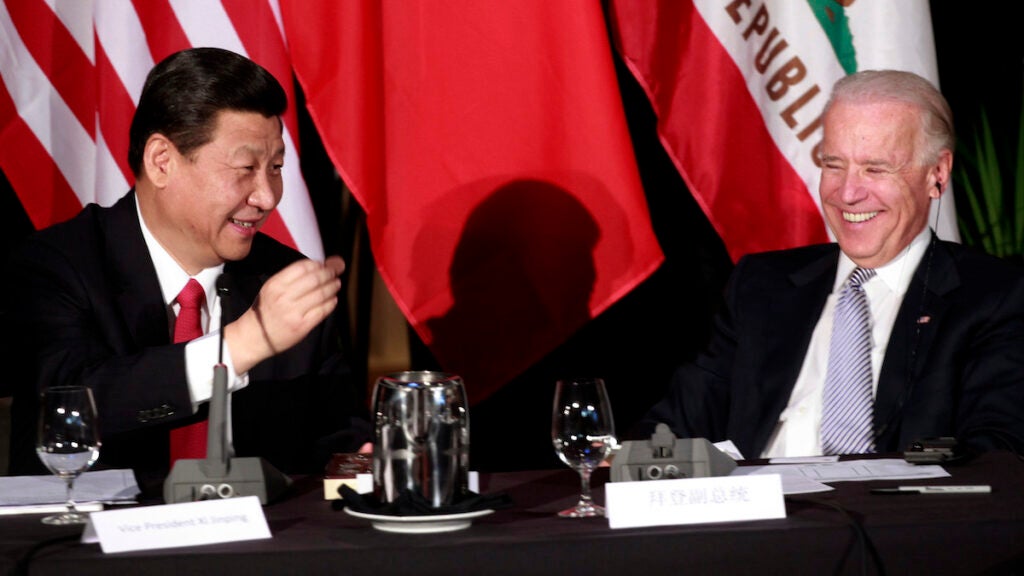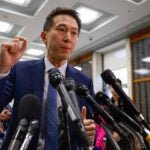I’m advising the leader of that delegation, Rep. Mike Gallagher, R-Wisc., who chairs the Select Committee on Strategic Competition between the United States and the Chinese Communist Party. I’ve spent 20-plus years entrenched in the Hollywood-China dynamic, and I’m one of many in the industry who helped educate Washington on the complicated bilateral engagement over that time. (My work with the committee is an unpaid engagement.)
I remember a happier time for Washington and Beijing: It was just over a decade ago when Joe Biden and Xi Jinping — both vice presidents of their countries at the time — sat down in Los Angeles to negotiate a new film treaty that allowed more American films into the country.
That was probably a high point in the relationship, as even before Donald Trump took office, officials in Washington were reconsidering growing U.S.-China ties. The Committee on Foreign Investment in the United States, or CFIUS, was moving to tighten restrictions on Chinese entities investing and operating in the U.S. and made it a big, public issue. The recent hearings over TikTok are just one example of the push that began almost eight years ago.
Gallagher is calling for a strategic rebalancing of the U.S.-China relationship and hoping to enlist the private sector’s help. There’s been a back and forth contest between proponents of bilateral engagement and those who would seek to throttle China’s rise. Right now, the throttlers are ascendant.

The status quo is unacceptable. In Hollywood, access to the Chinese market has meant tolerating Beijing’s global censorship and quietly elevating pro-China narratives. At the same time, the industry has had to accept inadequate revenue-share agreements and conditions like the majority stakes Chinese firms have taken in Disney and Universal’s theme parks in the country. Then there’s IP exploitation and outright theft of key technologies.
But full decoupling isn’t the answer. There are five forces that keep countries working together versus going to war. Think of them like cell-phone service: the fewer the bars, the weaker the connection. Two countries need at least one force, or bar, working to keep their connection. Three of those five forces are politics, national security, and human rights: We’re not going to get much signal across on any of those.
But the other two forces are culture and commerce. And those bars, for now, are still transmitting signals between the two superpowers.
Hollywood sits at the center of culture and commerce. Beyond the purely transactional, culture adds emotional and human connection, fostering a much stronger bond between countries. The cultural and commerce pairing works more strongly than, for example, the fragile national security and commerce-based relationship we have with Saudi Arabia. And it’s certainly better than the zero bars of service we currently share with Russia or North Korea.
That’s why Hollywood must be part of the solution. By collaborating, our community can help keep those two vital bars of connection while helping to design policies and regulations we can live with as an industry.
Without a healthy collaboration with Washington, I fear Hollywood will attempt to continue the status quo as China continues to impose its massive market leverage, forcing widespread industry compliance even as its domestic movie industry continues to rise, displacing American movies in theaters and smartphones.
We can’t have “one company, two systems,” as Stanford’s Jacob Helberg put it, where industries try to compromise in China and execute as usual elsewhere. Already, Congress is eyeing Hollywood’s censorship of films and TV shows it exports to China and sharply questioning the practice. Such close government scrutiny could lead to policies and laws ending most or all bilateral cultural exchange with China, where no one wins and we lose an important means of connection.
Gallagher’s select committee believes it’s possible for companies to avoid this “one foot in two, separating boats” predicament. Devising practical, constructive rules to level the bilateral playing field and protect the national security interests, values and principles Americans hold dearly can be accomplished. But they’re only possible if the business community steps up to help.
As tensions run high over everything from the status of Taiwan to the global semiconductor industry, there’s a lot at stake. It’s crucial to remember that China is a nuclear superpower. Gaslighting and heated rhetoric aren’t productive, nor is runaway hawkishness. We need to stand up for our values and our key industries.
That’s why I’m asking my peers in the entertainment industry to partner on the committee’s well-intentioned mission. Success depends on public and private sector leaders playing our A-game together, as a team, to effectively compete with China. The meetings between key Hollywood, Silicon Valley and Washington players this week are just the beginning of the work ahead.
"Hollywood" - Google News
April 05, 2023 at 06:34AM
https://ift.tt/x4n1Zms
Hollywood and China: Why Washington Is Talking to Bob Iger - TheWrap
"Hollywood" - Google News
https://ift.tt/7uckhs3
Shoes Man Tutorial
Pos News Update
Meme Update
Korean Entertainment News
Japan News Update
Bagikan Berita Ini


















0 Response to "Hollywood and China: Why Washington Is Talking to Bob Iger - TheWrap"
Post a Comment